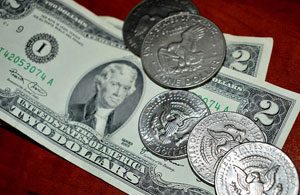Add Up Your Small Expenses to Overcome Unnecessary Spending
If you have heard of David Bach, then you are aware of the “latte factorâ€. It is the term given to how little expenses can add up over time and make a big difference in your monthly budget. Back when this term was first coined, it was a media whirlwind. Everyone was talking about how little expenses add up.
When you are trying to really cut back on your spending, is the latte factor approach the right one to take? Not necessarily. To dramatically reduce your monthly outflow, you need to look at your larger expenses first. These include items such as your mortgage/rent, car payments, and insurance.

(Photo Credit: Brett_Hondow)
Big Expenses vs. Small Expenses
If you can refinance your house and go from paying $1,000 per month to $800 that is a big savings. When you spend $3 a day on a cup of coffee, cutting it completely from your budget (meaning buying no coffee at all), you are saving $90.
Over the course of a year, the difference is dramatic. You save just under $2,500 from refinancing. You save just under $1,100 from cutting out coffee. And that means you can’t buy coffee for an entire year. Good luck with that!
Does paying attention to small expenses make sense for you? While it might seem like the answer is no, the reality is that you should still be paying attention to the small expenses that you make. I’m not suggesting you go without so you can apply that money to getting out of debt, but rather being aware of them will make a big difference in your overall budget.
Why Small Expenses Matter
I realize that saving $90 a month by going without coffee doesn’t sound like a significant thing. And taken by itself it isn’t. But when you add up various small expenses, it can make a difference.
For example, let’s say on a given day you buy a coffee ($3), eat your lunch out ($15) and grab a quick snack while on the run ($3). That is $21. Again, it doesn’t seem like a big deal. The problem is just that. It doesn’t feel like a big deal.
Fast forward two days from now and you forget that you spent $20 recently. You end up eating out again and buying another coffee. In another couple days, you forget again and do the same.
Spend like this 5 times during a month and you just spent $100. In a year that is over $1,000. Now I’m not suggesting that you eliminate all of your small spending. But I want you to be more aware of it.
This has helped me a lot. A few years ago, I was eating out on a regular basis. I would think that $10 here and there wasn’t a big deal. At the time, it certainly didn’t seem like it or feel like it. But at the end of the month, money would always be tight. I never could understand why. It remained this way until I took some time to look over my checking account record. I quickly realized how much it all added up.
How to Track Small Expenses
You mission is to start tracking your small expenses. I’m not asking you to track everything you buy but just note the smaller one-off purchases that you make. You can either carry a small pad and pen to record them or you can put them into your phone.
Whatever works for you is fine. The key is to just track them so you are aware of just how much the small purchases add up. You could even just review your checking account record like I did after the month. Don’t be surprised if you are surprised at just how much you do spend.
Overcoming Small Spending
For me, I cut back by focusing more on where I want to be financially. I want to retire as soon as possible. Taking 5 minutes to make a sandwich for lunch helps me to save money by not eating out and it helps me to keep more money in my pocket. This in turn will help me to reach my goal of retiring early.
Of course, just having money in your pocket can be a bad thing. When you are disciplined, you can make your money work for you. For me, I did this by making transfers. When I make my lunch instead of eating out, I transfer money to my savings account. Once my balance hits a certain dollar amount, I transfer this money to my brokerage account and invest the money.
This helps me to actually save money instead of just waiting to spend it on something else.
Final Thoughts
To make a large reduction in your monthly spending, look first at the large expenses you have. Try to figure out ways to reduce these as they will have a bigger impact on your bottom line as opposed to small expenses. See 16 Ways to Lower Your Housing Costs to get started.
But don’t overlook your small expenses. Take the time to track them so you can see just how much you are spending. Then take the initiative to figure out ways to stop spending that money and actually save it for your financial goals.




